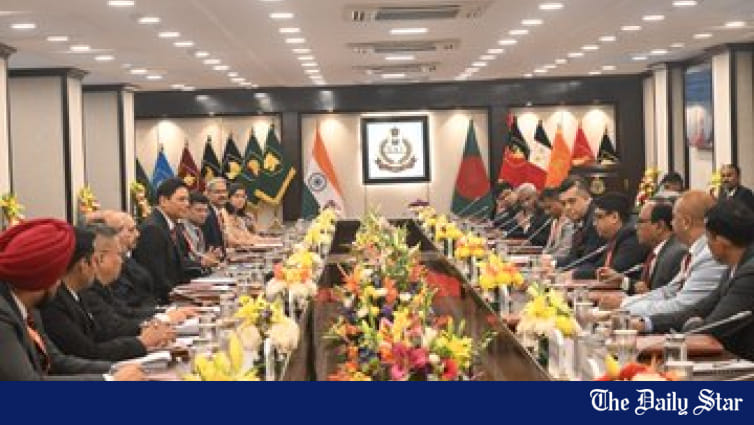Saif
Senior Member
- Messages
- 15,397
- Nation

- Axis Group


BGB-BSF talks: Killings at border can’t be justified
On the second day of the biannual BGB-BSF talks yesterday, Bangladesh reiterated the urgent need to ensure that no border killings take place.
BGB-BSF talks: Killings at border can’t be justified
Bangladesh tells India, discusses fencing

Photo: Collected
On the second day of the biannual BGB-BSF talks yesterday, Bangladesh reiterated the urgent need to ensure that no border killings take place.
The 55th meeting between the director generals of India's Border Security Force and the Border Guard Bangladesh in Delhi was the first since the fall of the Hasina-led regime.
According to meeting sources, Bangladesh argued that while Dhaka has no objection to trying border transgressors under existing laws, the killings cannot be justified.
"This is a sensitive issue for Bangladesh," the visiting delegation said at the meeting.
Meanwhile, the Indian delegation stated that implementing the coordinated border management plan is necessary to stop organised crime at the border, according to sources on both sides.
The BGB delegation is headed by Director General Maj General Mohammad Ashrafuzzaman Siddiqui, while the BSF is led by DG Daljit Singh Chawdhary.
The meeting also discussed the BSF's border fencing.
The Indian force claimed that the already-built single-row fences were "as per the past agreements between the sovereign governments of the two countries, which the BGB should abide by".
In a counter statement, the BGB said that as per the understanding between the two sides, fencing should be preceded by a "joint survey by border guards of both countries to decide where and how to set up the fences".
The ongoing meeting focused on measures to check cross-border crimes, including the smuggling of Phensedyl, yaba, other narcotics, and arms.
Sources said the overall atmosphere in the meeting was "friendly" and that sensitive bilateral issues were discussed "in a candid manner", even though strong arguments were presented.
The BSF yesterday hosted a dinner for the 14-member BGB delegation.
The summit in New Delhi was shortened to three days from five, and the talks have been "business-like", said sources.
Bangladesh tells India, discusses fencing
Photo: Collected
On the second day of the biannual BGB-BSF talks yesterday, Bangladesh reiterated the urgent need to ensure that no border killings take place.
The 55th meeting between the director generals of India's Border Security Force and the Border Guard Bangladesh in Delhi was the first since the fall of the Hasina-led regime.
According to meeting sources, Bangladesh argued that while Dhaka has no objection to trying border transgressors under existing laws, the killings cannot be justified.
"This is a sensitive issue for Bangladesh," the visiting delegation said at the meeting.
Meanwhile, the Indian delegation stated that implementing the coordinated border management plan is necessary to stop organised crime at the border, according to sources on both sides.
The BGB delegation is headed by Director General Maj General Mohammad Ashrafuzzaman Siddiqui, while the BSF is led by DG Daljit Singh Chawdhary.
The meeting also discussed the BSF's border fencing.
The Indian force claimed that the already-built single-row fences were "as per the past agreements between the sovereign governments of the two countries, which the BGB should abide by".
In a counter statement, the BGB said that as per the understanding between the two sides, fencing should be preceded by a "joint survey by border guards of both countries to decide where and how to set up the fences".
The ongoing meeting focused on measures to check cross-border crimes, including the smuggling of Phensedyl, yaba, other narcotics, and arms.
Sources said the overall atmosphere in the meeting was "friendly" and that sensitive bilateral issues were discussed "in a candid manner", even though strong arguments were presented.
The BSF yesterday hosted a dinner for the 14-member BGB delegation.
The summit in New Delhi was shortened to three days from five, and the talks have been "business-like", said sources.




